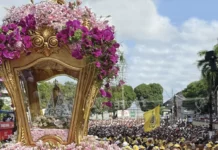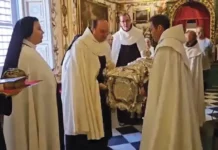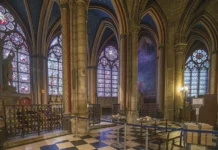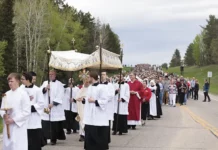Jubilee year for Catholic Faith bicentennial in Singapore
The two hundredth anniversary of the Church in Singapore began on December 13 with a Mass celebrated by Cardinal William Goh. Numerous commemorative events for the bicentenary will take place in 2021, including an exhibition of paintings and works by Christian artists, book presentations, the screening of religious films, a lecture on Singapore’s Catholic cultural heritage, and guided tours of historical sites.
The culmination of the jubilee celebration will be held during the week of December 4-11, 2021 with liturgical acts in the Cathedral of the Good Shepherd, the Church of Sts. Peter and Paul and St. Joseph, as well as in the Catholic Centre. On the last day, all thirty-two parishes of the Archdiocese will celebrate Mass simultaneously.
Another Perpetual Adoration chapel in Spain
Another Chapel for Perpetual Adoration of the Blessed Sacrament was inaugurated in Spain, this time in the city of Cartagena.
The Mass which opened the exposition of the Blessed Sacrament was presided over by the diocesan Bishop José Manuel Lorca Planes, who exhorted the faithful to approach Jesus through Mary, and declared: “Cartagena now has a beacon of hope capable of illuminating the hardest hearts.”
At present, the chapel’s opening hours are Monday to Friday, from 8:15 a.m. to 7:45 p.m., due to the sanitary measures in place. As soon as permitted, it will remain perpetually open. Spain is already blessed with nearly seventy other locations where Our Lord Jesus Christ is perpetually adored under the Eucharistic species.
Scholars find Psalter used by St. Thomas Beckett

Christopher de Hamel, librarian at Corpus Christi College, Cambridge, and medieval historian Eyal Poleg of Queen Mary University, London, claim to have found the Psalter used by St. Thomas Becket in his prayers.
It was a chance discovery during a meeting between the two, in which Poleg mentioned that a list of treasures kept in Canterbury Cathedral, written in the 14th century, included the following description: “Bound together with the Psalter of St. Thomas, in gilded silver and decorated with jewels.” Hearing these words, Hamel recalled seeing a volume in Cambridge with these characteristics, donated by the Bishop Emeritus of Canterbury at the end of the 16th century.
After carefully analysing the available information, Hamel believes that this volume is indeed the Psalter of St. Thomas Becket, and even raises the possibility that he was martyred with the object in his hands.
Polish Bishops urge greater zeal for the Sacraments
In a note published on its official website, the Polish Bishops’ Conference made it clear that Masses watched online do not have the same value as attending the Holy Eucharist in person. The main reason for this is the impossibility of receiving the Sacred Species in the former, which prevents the faithful from fully participating in the Holy Sacrifice.
They also warned that the dispensation from the precept granted to all the faithful because of the pandemic is a privilege and not an obligation. It should be used after a rigorous consideration of personal circumstances, for the norm is to attend Mass on such days; not to do so constitutes an exception.
Finally, priests are encouraged to show greater pastoral zeal in accompanying the faithful in their daily challenges, creating conditions which would facilitate their participation in the Eucharist, such as, for example, increasing the number of Masses.
Archaeologists identify site linked to St. John the Baptist

Recent excavations carried out by a Hungarian team in the ruins of the fortress of Machaerus, situated in Jordan, thirty-two kilometres southwest of Madaba, have identified the throne room where Herodias’ daughter asked the Tetrarch Herod Antipas for the head of St. John the Baptist (cf. Mt 14:6-11).
Built around 90 B.C., Machaerus was destroyed by the Roman Republic thirty-three years later, but Herod the Great rebuilt it around 30 B.C. Archaeological research began on the site in 1980, but the area where the throne room is located had remained unexplored until now.
Hungary clarifies concept of family in its Constitution
On December 15, the Hungarian parliament approved a proposal to amend its Constitution, presented on November 10 by Justice Minister Judit Varga, in which the family is currently defined as being based on marriage and the relationship between parents and children.
The amendment clarifies that “the mother is a woman and the father a man. Hungary defends the right of children to identify with their birth gender and safeguards their upbringing based on our nation’s constitutional identity and values based on our Christian culture.”
According to the new legislation, only married couples – a man and a woman – will be eligible to adopt a child. If an unmarried person wishes to adopt, their request must be approved by the Family Affairs Minister.
Polish parliament welcomes St. Maximilian Kolbe relics
At the request of several deputies and senators, relics of St. Maximilian Mary Kolbe were transferred to the chapel of the Polish parliament this past December 17. They were donated by the Franciscan Provincial, Fr. Grzegorz Bartosik, and received by Senator Elżbieta Witek, Senator Jerzy Chróścikowski and Fr. Piotr Burgoński, chaplain of the Lower House.
In the same chapel are already venerated relics of St. John Paul II and St. Gianna Beretta Molla, an Italian paediatrician who preferred to die due to complications in childbirth rather than undergo an abortion.
Statue of Mary placed atop bell tower in Iraq

The Syrian Catholic Church in Qaraqosh, Iraq,has been rebuilt after being destroyed by jihadist attacks. The last task carried out was the enthronement, on the bell tower, of a beautiful statue of Our Lady, this church’s Patroness.
Quaraqosh was long the most important Christian centre in the Nineveh Plain. In the summer of 2014, the Islamic State invaded the city, set fire to the church, destroyed the Christian symbols and blew up the bell tower. Only now has it been possible to complete the reconstruction work.
Elderly man killed for praying Rosary
At Antelope Valley Hospital in the Californian city of Lancaster, an 82-year-old patient, David Hernández García, was killed for reciting the Holy Rosary. The murderer, Jesse Martínez, was being treated in the same medical centre and shared a room with the victim. They did not know each other, but upon seeing him pray, Martínez became enraged and beat the elderly man with an oxygen cylinder.
Hospital staff rushed to his aid, but the attack was so violent that it resulted in David’s death. When police arrived, Jesse Martínez was arrested and could be sentenced to up to 28 years in prison. ◊







